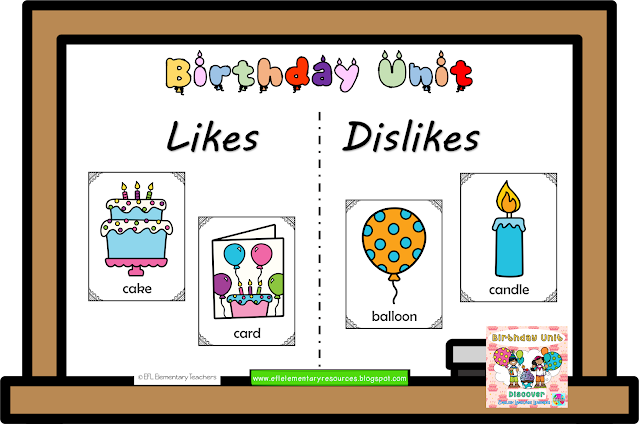This resource is included in The Birthday Unit: https://www.teacherspayteachers.com/Product/Birthday-Unit-for-Elementary-ESL-5279726
Print the key party vocabulary flashcards to help your students associate the vocabulary with visual images, making it easier for them to remember new vocabulary.
Have the students identify thebirthday party objects
using the birthday flashcards: hat, balloon, cake, presents, card, candle.
Ask students: What can you see?
Practice Colors & Details
Reviewing colors helps reinforce the birthday party vocabulary. Place two
flashcards and ask: What color is this balloon?
Students: It’s orange!
Focus on colors to encourage the students to observe the birthday party flashcards and describe objects in greater detail: What color are the candles?
Students: blue, purple, green!
Show a single flashcard with one present and say, “This is a
present. It is yellow.” Then, show a flashcard with several
presents and say, “They are presents. They are green and blue.”
Sorting the birthday objects.
Create two columns on the board labeled “It is” and “They are”. Show a flashcard and ask students to decide if it goes under “It is” or “They are.” Place the card in the correct column and have students say the corresponding sentence: It’s a card.
These flashcards become even more powerful when you use them to practice basic grammar: There is / There are
Reinforce that "there is" is used with singular nouns (one
object), while "there are" is used with plural nouns (more than one
object).
Teacher:
"There
is one cake". "There are five balloons."
Incorporate the numbers 1 to 10 using the flashcards. Birthdays often involve talking
about age, and students need to be comfortable with numbers to express how old
they are or how old someone else is.
Birthdays often involve counting items like
candles on a cake, balloons, or gifts. Have the students accurately count and
talk about these items using the flashcards.
Teachers: How cupcakes are there?
Students: One, two, three, for, five! Five cupcakes.
Ask and answer about age, using question words: How.
Start by teaching the basic question structure: “How old
are you?
Show a birthday flashcard with a picture of a boy or
girl with a number corresponding to the age and ask students: How old is
he?
Students: He’s eight!
Introduce new structures: Today is Anna’s Birthday.
She’s
nine years old.
Have the students say more sentences using the rest of
the flashcards.
To express likes and dislikes ( talking about preferences).
Teacher: I like cake! I don’t like balloons!
Make an emphasis on the final s.
Ask your students about their preferences and place that
flashcard on the board and you can even graph the party objects.
People do different actions in a party. Use any
tense that you want.
Teacher: What is he doing?
Students: He is opening a present.
Teach the phrase “Whose birthday is it?” by
modeling it several times. Place several flashcards on the board and ask,
"Whose birthday is it?"
Students: "It's Ann's birthday."
Explain the ‘s to indicate possession. Make
stick puppets ‘s to make it easier for the students to grasp the rule.
Talk about the
location of objects. Prepositions.
Use the flashcards to demonstrate prepositions like
"in
front of," "behind," "next to," "on," and
"under":
Teacher: "The candle is on the
cupcake."
Invite students to prepare their own cutouts using
the template provided and move the cutouts themselves, using the correct
prepositions in sentences.
Visit my store today to find resources that are ready to use and perfect
for supporting your elementary ELLs. Your feedback is always appreciated as I
continue to develop materials that meet the needs of both teachers and
students.
Here’s the link to my store: https://www.teacherspayteachers.com/store/holistic-english-resources-by-rosa-amelia



















No hay comentarios:
Publicar un comentario